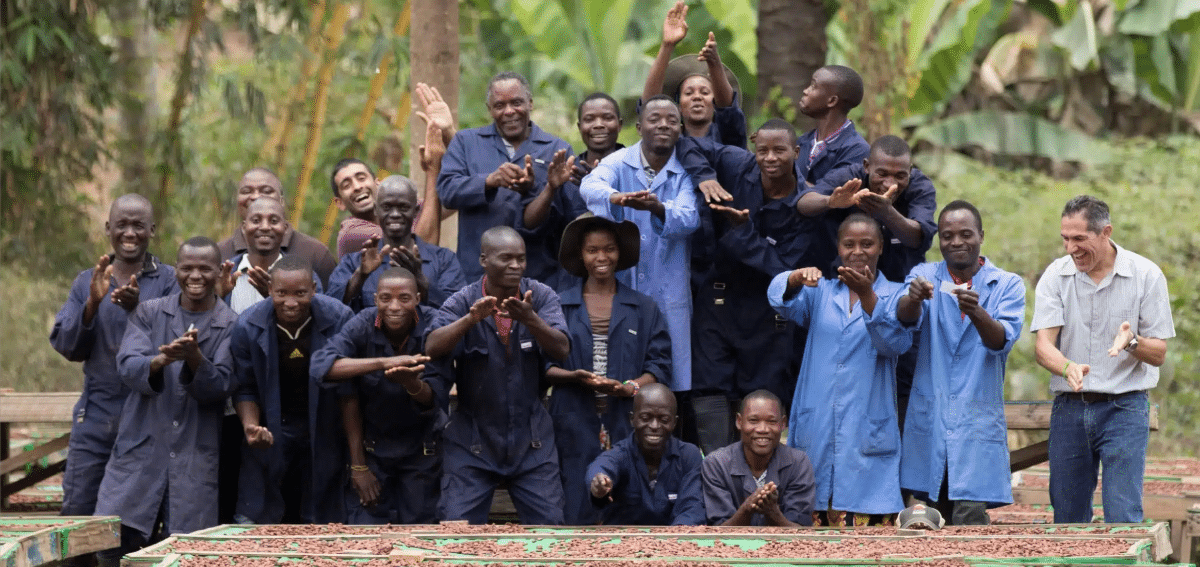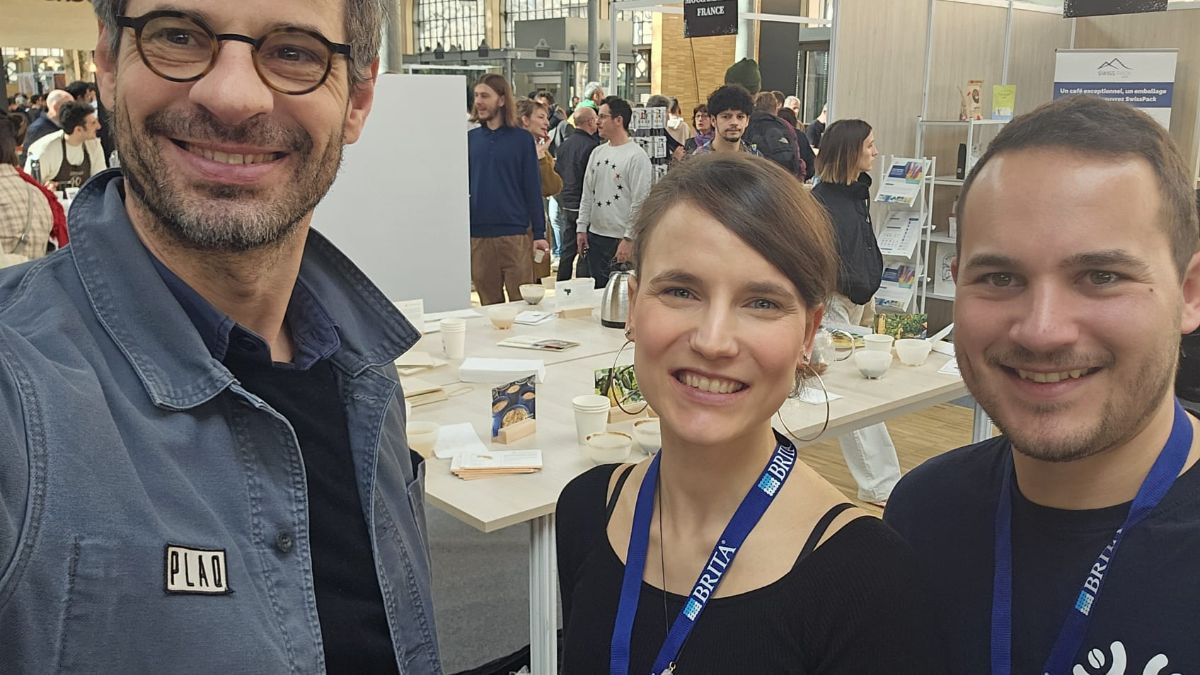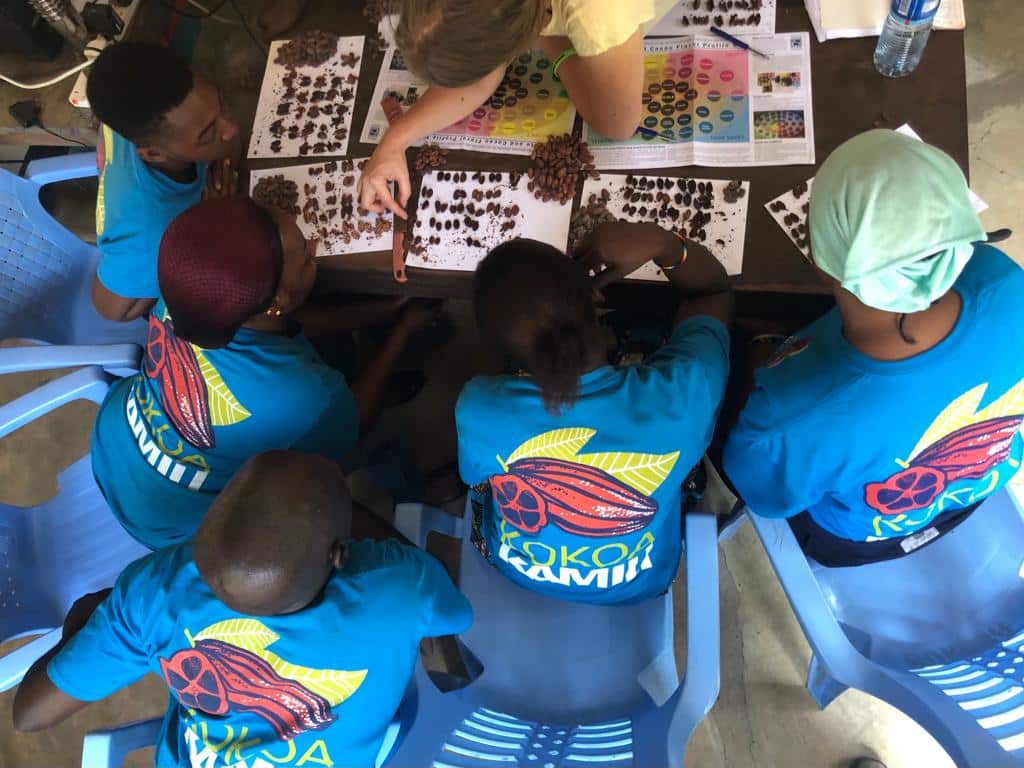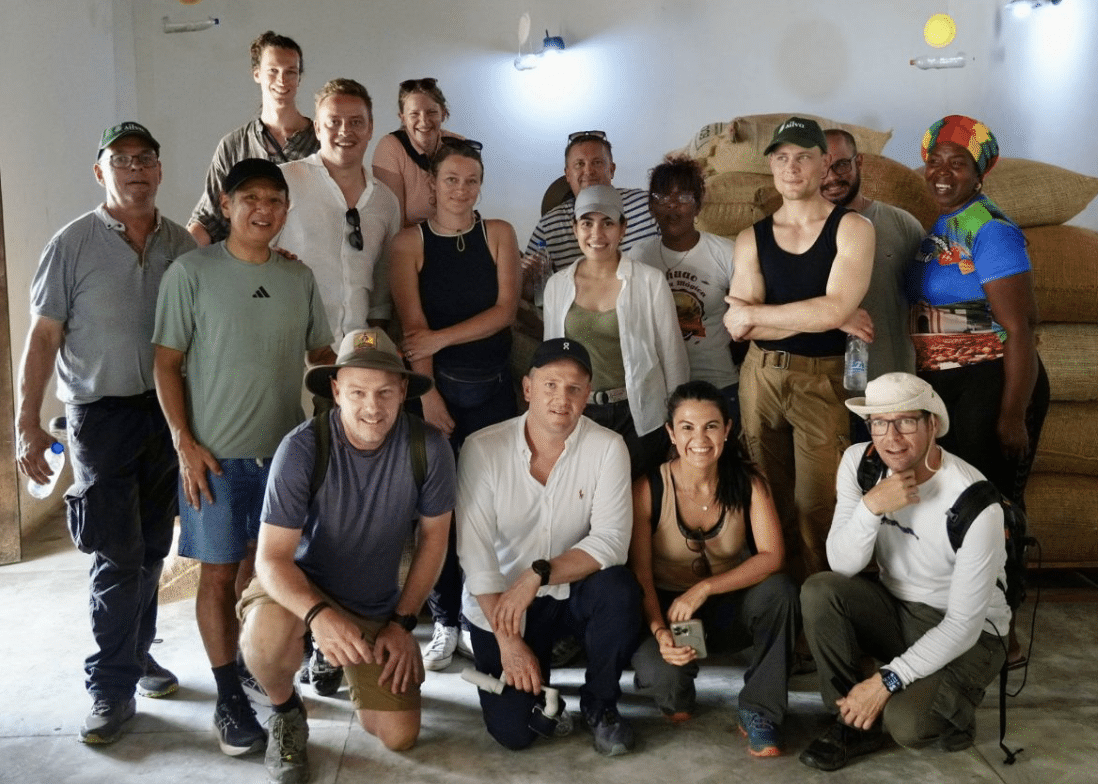L’UNION FAIT LA FORCE
THE POWER OF COLLABORATION IN CHOCOLATE
THE POWER OF COLLABORATION IN CHOCOLATE
FROM SOIL TO SOLIDARITY
At Silva Cacao, we believe that great chocolate is more than a product -it’s the outcome of shared values, deep relationships, and collective action. From cacao cooperatives at origin to artisan makers across Europe, collaboration has always been key to building resilience, protecting quality, and amplifying positive impact.
While Silva is not a cooperative, we actively support and engage with the wider ecosystem of farmers, makers, and innovators who work together to strengthen our sector. This spirit of unity -seen in farmer cooperatives, craft movements, and now industry associations, matters now more than ever.
A TRADITION OF SOLIDARITY – WHERE IT ALL BEGAN
Across cacao-growing regions, smallholder farmers have long depended on one powerful structure to support and sustain their livelihoods: the cooperative.
A cacao cooperative is a business organisation that is both owned and democratically governed by its member farmers. Leadership is elected from within the membership, ensuring that the cooperative is managed in a way that represents and serves the collective interests of its community.

- processing beans professionally through fermentation and drying,
- providing tools, technical training, and essential infrastructure,
- improving access to local and international markets,
- and by helping preserve biodiversity, agroforestry practices, and traditional knowledge passed down through generations
This solidarity echoes across borders. In Europe, artisan chocolate makers share these values -understanding that collaboration is key to opening up markets, protecting integrity, raising quality, and creating lasting, positive change.
SOLIDARITY IN FRENCH CRAFT CHOCOLATE: A HISTORICAL TURNING POINT
The modern craft chocolate movement draws on a rich tradition of solidarity -communities united by shared values like preserving artisanal knowledge, fostering pride in craft, and supporting one another.
A defining chapter of this story unfolded in France, a country with a deep culinary heritage and a unique historical relationship with chocolate. From Napoleon’s era, when chocolate was classified as a medicinal product allowed only by royal decree, to the early 20th century, chocolate remained a rare and treasured delicacy.
In the 1970s–80s, French artisans launched a cultural response to the growing presence of international chocolate brands by reclaiming chocolate as an artisanal craft worthy of distinction. Small, family-run bakeries and pâtisseries began forming informal networks to share techniques and elevate chocolate beyond a mere ingredient –celebrating craftsmanship and the chocolatier as an artiste.
Thanks to pioneering makers like Bonnat, Maison Bernachon, Manufacture Cluizel, Pralus Maître Chocolatier,… beans and origin gradually gained recognition as essential elements of quality and identity, although the core focus remained on skill, creativity, and sensory refinement.
The Académie Française du Chocolat et de la Confiserie has played a crucial role as the moral authority and guardian of tradition, evolution, and professional ethics in chocolate and confectionery. It promotes and preserves French traditions, enhances professional skills, and fosters technical excellence -helping to position chocolate as a culinary art.
This French movement transformed chocolate locally and laid important groundwork for the global craft chocolate evolution, which echoes specialty coffee’s own journey. Drawing inspiration from organisations like the Specialty Coffee Association, today’s craft chocolate community is building international collaborations, establishing shared standards, and nurturing more knowledgeable, engaged consumers.

A significant milestone for this young industry came on September 25th, 2023, with the launch of the first-ever Guide for the Assessment of Cacao Quality and Flavour –a global framework offering a structured sensory evaluation of cacao across aroma, flavour, and post-harvest practices. For comparison, the specialty coffee movement, which began in the 1970s, only recently released the second update to its Coffee Sensory and Cupping Handbook, nearly 30 years after its first edition. While the craft chocolate sector remains young, it is advancing with clear collaboration and purpose.

All these efforts have sparked the creation of national bean-to-bar associations worldwide -each reflecting its unique context but united by principles of transparency, craftsmanship, and solidarity.
FROM FRENCH ROOTS TO A FLOURISHING NETWORK: THE RISE OF NATIONAL BEAN TO BAR ASSOCIATIONS
What began as small, artisan-led initiatives has blossomed into a vibrant global movement -thriving across borders and firmly rooted in solidarity. With shared tools, growing consumer awareness, and stronger collaboration between makers and farmers, the chocolate community is writing a new chapter -one defined by knowledge, connection, and a deep appreciation of cacao’s full potential.
Across Europe and beyond, local chocolate makers are coming together within national associations, uniting around shared values of fairness, transparency, and community-driven collaboration. These associations not only strengthen their local craft communities but also connect with each other internationally, building a more balanced and interconnected chocolate ecosystem.
Since Brazil pioneered the movement with its national association in 2018, momentum has steadily grown. Spain followed in 2019, becoming the first European country to establish a formal craft chocolate network. France -a longtime leader in artisanal chocolate, solidified its position in 2022. In 2023, both Italy and Portugal launched national organisations, while Japan introduced an association rooted in quality, precision, and local identity. Meanwhile, the UK and Belgium are actively exploring the development of their own national networks.
“At Bean to Bar France, our strength lies in a vibrant community of passionate makers, united by core values of transparency, quality, ethics, and traceability. Through dynamic initiatives -like our inspiring three-day annual gatherings, we build strong relationships and drive collective action toward a fairer, more sustainable cocoa industry.”
Marina Blanck Stroh – President Bean to Bar France
Together, these growing associations are shaping a more collaborative, transparent, and ethical craft chocolate landscape -fuelling a global movement deeply rooted in solidarity and shared purpose.

CRAFT CHOCOLATE IN GLOBAL CONTEXT
Though still small in scale, craft chocolate makers are becoming an increasingly vital voice in the global cacao and chocolate conversation -influencing issues from sustainability and ethics to quality and policy.
This growing presence now works alongside established organisations such as:
- CHOCOA: An annual Amsterdam-based event that brings together stakeholders across the cacao and chocolate value chain to promote sustainability and transparency.
- COEX (Cacao of Excellence): A global initiative to discover, recognise, and promote superior cacao, while supporting producers with tools, knowledge, and networks to ensure their quality is fairly valued.
- ICCO (International Cocoa Organisation): A platform that facilitates international dialogue and policymaking for sustainable cocoa development.
Other key groups include FCIA (Fine Chocolate Industry Association), ICCR (Institute for Cacao and Chocolate Research), and CAOBISCO (Association of Chocolate, Biscuit and Confectionery Industries of the European Union), ECA (European Cocoa Association), …
As these platforms evolve, craft chocolate is moving from the margins to the centre of the conversation –helping to reframe priorities, bridge value chain gaps, and guide the industry toward a more just, quality-driven future.
UNITING EUROPE’S MAKERS: A COLLECTIVE STEP FORWARD
Despite growing consumer interest in single-origin and ethically made chocolate, many craft makers across Europe face common barriers: limited visibility, fragmented markets, and the burden of maintaining sustainability standards -often in isolation. Meanwhile, the term ‘craft’ is increasingly used without accountability, weakening its meaning and value. These realities highlight the need for coordination, credibility, and cross-border representation.
The European Bean to Bar Chocolate Association (EBTBCA) emerges as a response -a non-commercial, community-driven initiative to unite and empower Europe’s bean to bar chocolate makers. While still in its early days, the EBTBCA builds on national efforts while creating a pan-European platform for collaboration, advocacy, and education.
THE EUROPEAN BEAN TO BAR CHOCOLATE ASSOCIATION (EBTBCA)
PURPOSE
To unite European bean to bar chocolate makers and promote excellence, traceability, transparency, and sustainability.
OBJECTIVES
- Recognition & Standards: Define and advocate for bean to bar as a distinct, high-quality craft.
- Support for Makers: Provide tools, training, and shared resources to foster long-term growth.
- Coordination Across Countries: Strengthen impact through unified actions and campaigns.
- Consumer Education: Raise awareness of the values behind craft chocolate.
- Institutional Engagement: Collaborate with European policymakers to shape a supportive regulatory environment.
In response to this need, the European Bean-to-Bar Chocolate Association (EBTBCA) is being formed -a non-commercial, community-driven initiative designed to support artisan chocolate makers across the continent. Still in its early stages, the EBTBCA complements existing national networks while creating a shared platform for cross-border advocacy, education, and collaboration.
“The goal of the European Bean to Bar Chocolate Association is to bring together makers across Europe to speak with one voice -building a strong, unified platform that promotes quality, transparency, and ethical values in craft chocolate.”
Rosario Cunha – Vice-Chairman, European Bean to Bar Chocolate Association
COMMITMENT
The EBTBCA aims to become a central hub for artisan chocolate in Europe -facilitating knowledge exchange, amplifying shared values, and enhancing the credibility of the craft movement.
At Silva Cacao, we’re proud to support this initiative. Katrien Delaet, our Chief Cacaopreneur, serves as an advisor -bringing her deep expertise in cacao sourcing and origin. She works alongside respected advisors such as Chloé Doutré-Roussel -a leading voice in bean to bar chocolate making, and Spencer Hyman, who passionately leads education and consumer engagement efforts.
THE EUROPEAN BEAN-TO-BAR CHOCOLATE ASSOCIATION – WHY IT MATTERS?
- Greater Visibility & Credibility: Showcase your work on a recognised European platform.
- Stronger Marketing Reach: Benefit from joint campaigns, events, and storytelling.
- Community of Peers: Exchange ideas, build collaborations, and stay inspired.
- Education & Resources: For makers and consumers alike.
- Timely Industry Updates: Stay informed about regulations, standards, and funding.
- Access to Opportunities: Partnerships, visibility, and funding through collective power.
- Shared Representation & Discounts: For events like Chocoa and beyond.
The EBTBCA doesn’t seek to replace existing institutions -it seeks to bridge a gap. While large organisations influence regulation and trade, small producers bring ground-level insights into ethics, traceability, craft, and culture. The EBTBCA offers a way to connect these perspectives. Its role is simple, but significant: to make sure artisan makers aren’t just impacted by chocolate policy -they’re helping to shape it.
KEY INGREDIENTS FOR A SUCCESFUL COMMUNITY
For a network like the EBTBCA to truly thrive, it must be grounded in clear values and collaborative principles.
Drawing on decades of industry experience, cooperative models, and expert guidance -including insights from Dr. Carla D. Martin -Lecturer at Harvard University and President of the Board at the Institute for Cacao and Chocolate Research, a leading authority on cacao associations, federations, and farmer cooperatives -these are the essential ingredients for building a resilient and effective association:
- Motivated Core Team: A small, focused group united by a shared vision and purpose.
- Democratic Governance: Transparent, member-first decision-making that empowers everyone.
- Trust-Based Collaboration: Sharing knowledge, visibility, and opportunities openly, not hoarding them.
- Education as a Cornerstone: Trainers and teachers as vital agents of change and growth.
- Clear Priorities: Commit only to what can be delivered, and deliver it with excellence.
- Collective Mindset: Success is shared, egos are set aside.
- Build on existing foundations: Honour and celebrate the pioneering work that has shaped this community over the past 50 years (Vive la France!). Learn from these lessons to inspire ongoing collaboration and progress in today’s evolving craft chocolate landscape.
- Ecosystem Thinking: Craft chocolate goes beyond production, it includes farming, events, education, and distribution.
- Shared Accountability: Together, let’s raise the bar higher.
At its core, the success of any association -including EBTBCA, depends on its people and principles. With this foundation, we can build a vibrant, connected, and forward-looking craft chocolate community.
L’UNION FAIT LA FORCE: A FUTURE BUILT ON CONNECTION
From cacao cooperatives at origin to emerging alliances across Europe, a quiet but powerful shift is underway. Small-scale actors are coming together -to protect their values, share knowledge, and strengthen their role in the global chocolate industry.
“At origin and in Europe, one principle is clear: the future of cacao and chocolate is stronger when shared. L’union fait la force. There is strength in unity.”
Katrien Delaet – Chief Cacaopreneur Silva Cacao

The EBTBCA is part of this (r)evolution. By connecting chocolate makers across languages, cultures, and growth stages, it supports collaboration, advocates for shared interests, and contributes to a transparent, resilient craft chocolate sector.
Whether you’re part of a national association or navigating the bean to bar chocolate landscape solo, the European Bean to Bar Chocolate Association invites you to join the EBTBCA community and shape the future of European craft chocolate -together.
SAVE THE DATE: 4–9 February 2026 in Amsterdam, Netherlands
EBTBCA will be present at Chocoa 2026 -one of the world’s leading platforms for fine and sustainable cacao and chocolate.
Stay tuned for announcements, programming, and opportunities to engage.

NOTES, KUDO’S, CREDITS & INSPO
Thank you for your valuable insights: Marina Blanck Stroh, Rosario Cunha, Carla Martin and Katrien Delaet
Crafting the Culture and history of French Chocolate – Susan J Terrio
SILVA CACAO: Plantation Cacao – Social Enterprise – Cacao Cooperative
Guide for the Assessment of Cacao Quality and Flavour.
EBBCA – European Bean to Bar Chocolate Association
ICCR – The Institute for Cacao and Chocolate Research formerly the FCCI – Fine Cacao and Chocolate Institute
COEX – Cacao of Excellence
ICCO – International Cocoa Organisation
ECA – European Cocoa Association
FCCI – Fine Cacao and Chocolate Institute
CHOCOA – Annual Trade Fair, Forum, Conferences in Amsterdam
Bean to Bar FRANCE
Bean to Bar SPAIN
Bean to Bar BRAZIL
Bean to Bar ITALY
Bean to Bar PORTUGAL
Bean to Bar JAPAN
